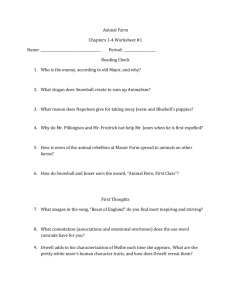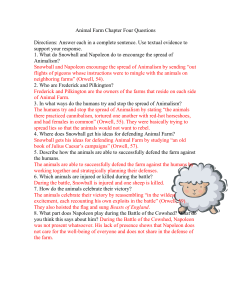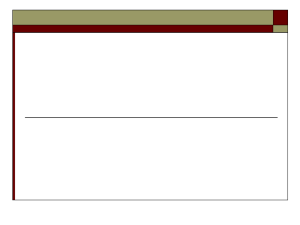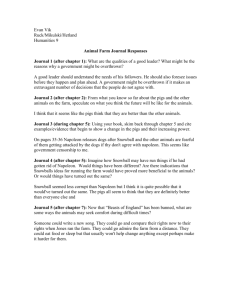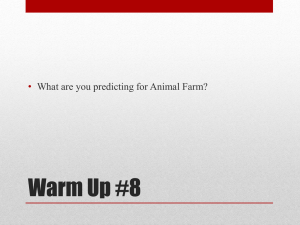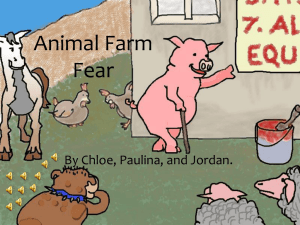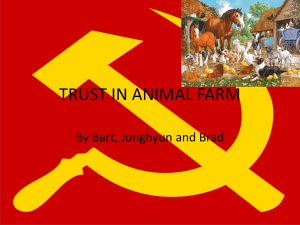George Orwell Animal Farm Chapter 2
advertisement
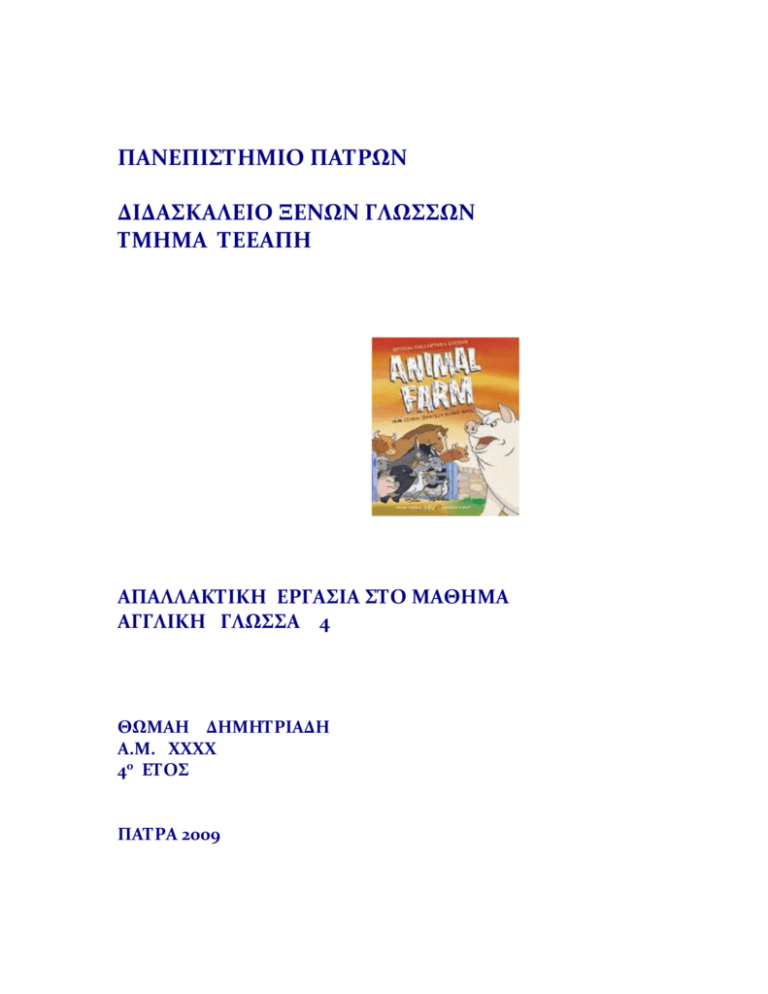
ΠΑΝΕΠΙΣΤΗΜΙΟ ΠΑΤΡΩΝ ΔΙΔΑΣΚΑΛΕΙΟ ΞΕΝΩΝ ΓΛΩΣΣΩΝ ΤΜΗΜΑ ΤΕΕΑΠΗ ΑΠΑΛΛΑΚΤΙΚΗ ΕΡΓΑΣΙΑ ΣΤΟ ΜΑΘΗΜΑ ΑΓΓΛΙΚΗ ΓΛΩΣΣΑ 4 ΘΩΜΑΗ ΔΗΜΗΤΡΙΑΔΗ Α.Μ. ΧΧΧΧ 4ο ΕΤΟΣ ΠΑΤΡΑ 2009 2 George Orwell Animal Farm Chapter 2 Three nights later old Major died peacefully in his sleep. His body was buried at the foot of the orchard. This was early in March. During the next three months there was much secret activity. Major's speech had given to the more intelligent animals on the farm a completely new outlook on life. They did not know when the Rebellion predicted by Major would take place, they had no reason for thinking that it would be within their own lifetime, but they saw clearly that it was their duty to prepare for it. The work of teaching and organising the others fell naturally upon the pigs, who were generally recognised as being the cleverest of the animals. Pre-eminent among the pigs were two young boars named Snowball and Napoleon, whom Mr. Jones was breeding up for sale. Napoleon was a large, rather fierce-looking Berkshire boar, the only Berkshire on the farm, not much of a talker, but with a reputation for getting his own way. Snowball was a more vivacious pig than Napoleon, quicker in speech and more inventive, but was not considered to have the same depth of character. All the other male pigs on the farm were porkers. The best known among them was a small fat pig named Squealer, with very round cheeks, twinkling eyes, nimble movements, and a shrill voice. He was a brilliant talker, and when he was arguing some difficult point he had a way of skipping from side to side and whisking his tail which was somehow very persuasive. The others said of Squealer that he could turn black into white. These three had elaborated old Major's teachings into a complete system of thought, to which they gave the name of Animalism. Several nights a week, after Mr. Jones was asleep, they held secret meetings in the barn and expounded the principles of Animalism to the others. At the beginning they met with much stupidity and apathy. Some of the animals talked of the duty of loyalty to Mr. Jones, whom they referred to as "Master," or made elementary remarks such as "Mr. Jones feeds us. If he were gone, we should starve to death." Others asked such questions as "Why should we care what happens after we are dead?" or "If this Rebellion is to happen anyway, what difference does it make whether we work for it or not?", and the pigs had great difficulty in making them see that this was contrary to the spirit of Animalism. The stupidest questions of all were asked by Mollie, the white mare. The very first question she asked Snowball was: "Will there still be sugar after the Rebellion?" "No," said Snowball firmly. "We have no means of making sugar on this farm. Besides, you do not need sugar. You will have all the oats and hay you want." "And shall I still be allowed to wear ribbons in my mane?" asked Mollie. "Comrade," said Snowball, "those ribbons that you are so devoted to are the badge of slavery. Can you not understand that liberty is worth more than ribbons?" 3 Mollie agreed, but she did not sound very convinced. The pigs had an even harder struggle to counteract the lies put about by Moses, the tame raven. Moses, who was Mr. Jones's especial pet, was a spy and a tale-bearer, but he was also a clever talker. He claimed to know of the existence of a mysterious country called Sugarcandy Mountain, to which all animals went when they died. It was situated somewhere up in the sky, a little distance beyond the clouds, Moses said. In Sugarcandy Mountain it was Sunday seven days a week, clover was in season all the year round, and lump sugar and linseed cake grew on the hedges. The animals hated Moses because he told tales and did no work, but some of them believed in Sugarcandy Mountain, and the pigs had to argue very hard to persuade them that there was no such place. Their most faithful disciples were the two cart-horses, Boxer and Clover. These two had great difficulty in thinking anything out for themselves, but having once accepted the pigs as their teachers, they absorbed everything that they were told, and passed it on to the other animals by simple arguments. They were unfailing in their attendance at the secret meetings in the barn, and led the singing of 'Beasts of England', with which the meetings always ended. Now, as it turned out, the Rebellion was achieved much earlier and more easily than anyone had expected. In past years Mr. Jones, although a hard master, had been a capable farmer, but of late he had fallen on evil days. He had become much disheartened after losing money in a lawsuit, and had taken to drinking more than was good for him. For whole days at a time he would lounge in his Windsor chair in the kitchen, reading the newspapers, drinking, and occasionally feeding Moses on crusts of bread soaked in beer. His men were idle and dishonest, the fields were full of weeds, the buildings wanted roofing, the hedges were neglected, and the animals were underfed. June came and the hay was almost ready for cutting. On Midsummer's Eve, which was a Saturday, Mr. Jones went into Willingdon and got so drunk at the Red Lion that he did not come back till midday on Sunday. The men had milked the cows in the early morning and then had gone out rabbiting, without bothering to feed the animals. When Mr. Jones got back he immediately went to sleep on the drawing-room sofa with the News of the World over his face, so that when evening came, the animals were still unfed. At last they could stand it no longer. One of the cows broke in the door of the store-shed with her horn and all the animals began to help themselves from the bins. It was just then that Mr. Jones woke up. The next moment he and his four men were in the store-shed with whips in their hands, lashing out in all directions. This was more than the hungry animals could bear. With one accord, though nothing of the kind had been planned beforehand, they flung themselves upon their tormentors. Jones and his men suddenly found themselves being butted and kicked from all sides. The situation was quite out of their control. They had never seen animals behave like this before, and this sudden uprising of creatures whom they were used to thrashing and maltreating just as they chose, frightened them almost out of their wits. After only a moment or two they gave up trying to defend themselves and took to their heels. A minute later all five of them were in full flight down the cart-track that led to the main road, 4 with the animals pursuing them in triumph. Mrs. Jones looked out of the bedroom window, saw what was happening, hurriedly flung a few possessions into a carpet bag, and slipped out of the farm by another way. Moses sprang off his perch and flapped after her, croaking loudly. Meanwhile the animals had chased Jones and his men out on to the road and slammed the five-barred gate behind them. And so, almost before they knew what was happening, the Rebellion had been successfully carried through: Jones was expelled, and the Manor Farm was theirs. For the first few minutes the animals could hardly believe in their good fortune. Their first act was to gallop in a body right round the boundaries of the farm, as though to make quite sure that no human being was hiding anywhere upon it; then they raced back to the farm buildings to wipe out the last traces of Jones's hated reign. The harness-room at the end of the stables was broken open; the bits, the nose-rings, the dog-chains, the cruel knives with which Mr. Jones had been used to castrate the pigs and lambs, were all flung down the well. The reins, the halters, the blinkers, the degrading nosebags, were thrown on to the rubbish fire which was burning in the yard. So were the whips. All the animals capered with joy when they saw the whips going up in flames. Snowball also threw on to the fire the ribbons with which the horses' manes and tails had usually been decorated on market days. "Ribbons," he said, "should be considered as clothes, which are the mark of a human being. All animals should go naked." When Boxer heard this he fetched the small straw hat which he wore in summer to keep the flies out of his ears, and flung it on to the fire with the rest. In a very little while the animals had destroyed everything that reminded them of Mr. Jones. Napoleon then led them back to the store-shed and served out a double ration of corn to everybody, with two biscuits for each dog. Then they sang 'Beasts of England' from end to end seven times running, and after that they settled down for the night and slept as they had never slept before. But they woke at dawn as usual, and suddenly remembering the glorious thing that had happened, they all raced out into the pasture together. A little way down the pasture there was a knoll that commanded a view of most of the farm. The animals rushed to the top of it and gazed round them in the clear morning light. Yes, it was theirs--everything that they could see was theirs! In the ecstasy of that thought they gambolled round and round, they hurled themselves into the air in great leaps of excitement. They rolled in the dew, they cropped mouthfuls of the sweet summer grass, they kicked up clods of the black earth and snuffed its rich scent. Then they made a tour of inspection of the whole farm and surveyed with speechless admiration the ploughland, the hayfield, the orchard, the pool, the spinney. It was as though they had never seen these things before, and even now they could hardly believe that it was all their own. Then they filed back to the farm buildings and halted in silence outside the door of the farmhouse. That was theirs too, but they were frightened 5 to go inside. After a moment, however, Snowball and Napoleon butted the door open with their shoulders and the animals entered in single file, walking with the utmost care for fear of disturbing anything. They tiptoed from room to room, afraid to speak above a whisper and gazing with a kind of awe at the unbelievable luxury, at the beds with their feather mattresses, the looking-glasses, the horsehair sofa, the Brussels carpet, the lithograph of Queen Victoria over the drawing-room mantelpiece. They were lust coming down the stairs when Mollie was discovered to be missing. Going back, the others found that she had remained behind in the best bedroom. She had taken a piece of blue ribbon from Mrs. Jones's dressing-table, and was holding it against her shoulder and admiring herself in the glass in a very foolish manner. The others reproached her sharply, and they went outside. Some hams hanging in the kitchen were taken out for burial, and the barrel of beer in the scullery was stove in with a kick from Boxer's hoof, otherwise nothing in the house was touched. A unanimous resolution was passed on the spot that the farmhouse should be preserved as a museum. All were agreed that no animal must ever live there. The animals had their breakfast, and then Snowball and Napoleon called them together again. "Comrades," said Snowball, "it is half-past six and we have a long day before us. Today we begin the hay harvest. But there is another matter that must be attended to first." The pigs now revealed that during the past three months they had taught themselves to read and write from an old spelling book which had belonged to Mr. Jones's children and which had been thrown on the rubbish heap. Napoleon sent for pots of black and white paint and led the way down to the five-barred gate that gave on to the main road. Then Snowball (for it was Snowball who was best at writing) took a brush between the two knuckles of his trotter, painted out MANOR FARM from the top bar of the gate and in its place painted ANIMAL FARM. This was to be the name of the farm from now onwards. After this they went back to the farm buildings, where Snowball and Napoleon sent for a ladder which they caused to be set against the end wall of the big barn. They explained that by their studies of the past three months the pigs had succeeded in reducing the principles of Animalism to Seven Commandments. These Seven Commandments would now be inscribed on the wall; they would form an unalterable law by which all the animals on Animal Farm must live for ever after. With some difficulty (for it is not easy for a pig to balance himself on a ladder) Snowball climbed up and set to work, with Squealer a few rungs below him holding the paint-pot. The Commandments were written on the tarred wall in great white letters that could be read thirty yards away. They ran thus: THE SEVEN COMMANDMENTS 1. Whatever goes upon two legs is an enemy. 2. Whatever goes upon four legs, or has wings, is a friend. 3. No animal shall wear clothes. 4. No animal shall sleep in a bed. 5. No animal shall drink alcohol. 6. No animal shall kill any other animal. 6 7. All animals are equal. It was very neatly written, and except that "friend" was written "freind" and one of the "S's" was the wrong way round, the spelling was correct all the way through. Snowball read it aloud for the benefit of the others. All the animals nodded in complete agreement, and the cleverer ones at once began to learn the Commandments by heart. "Now, comrades," cried Snowball, throwing down the paint-brush, "to the hayfield! Let us make it a point of honour to get in the harvest more quickly than Jones and his men could do." But at this moment the three cows, who had seemed uneasy for some time past, set up a loud lowing. They had not been milked for twenty-four hours, and their udders were almost bursting. After a little thought, the pigs sent for buckets and milked the cows fairly successfully, their trotters being well adapted to this task. Soon there were five buckets of frothing creamy milk at which many of the animals looked with considerable interest. "What is going to happen to all that milk?" said someone. "Jones used sometimes to mix some of it in our mash," said one of the hens. "Never mind the milk, comrades!" cried Napoleon, placing himself in front of the buckets. "That will be attended to. The harvest is more important. Comrade Snowball will lead the way. I shall follow in a few minutes. Forward, comrades! The hay is waiting." So the animals trooped down to the hayfield to begin the harvest, and when they came back in the evening it was noticed that the milk had disappeared. 7 Vocabulary p.2 Outlook = προοπτική Preeminent= ξεχωριστός, διαπρεπής Boar-s =αρσενικό γουρούνι Breeding up> breed -bred –bred =τρέφω, εκτρέφω Fierce looking = αγριωπός Vivacious=ζωηρός Inventive=εφευρετικός, επινοητικός Porker-s= γουρούνι θρεφτάρι Twinkling eyes= σπινθηροβόλα μάτια Nimble movements= ανάλαφρες κινήσεις Shrill voice=διαπεραστική φωνή Skip=πηδώ ανάλαφρα Whisk one’s tail= κουνάω την ουρά Turn black into white= κάνω το μαύρο άσπρο Elaborate= αναπτύσσω, ερμηνεύω Animalism = ‘ανιμαλισμός’ > εδώ ζωοκρατία > η επικράτηση και διακυβέρνηση της φάρμας από τα ζώα Barn= αποθήκη Expound= εξηγώ, ερμηνεύω Loyalty= νομιμοφροσύνη mare= φοράδα άλογο p.3 oats and hay= βρώμη σανό (τροφή για ζώα) badge of slavery= σήμα σκλαβιάς counteract=αντιδρώ, εξουδετερώνω tame raven= ήμερο κοράκι tale-bearer= κουτσομπόλης, σπερμολόγος lump sugar=κομμάτι ζάχαρης linseed=λινόσπορος faithful disciple=πιστός μαθητής, οπαδός unfailing in attendance=αδιάλειπτη, αδιάκοπη παρακολούθηση fall on evil days=πέφτω σε άσχημους καιρούς, become disheartened= αποθαρρύνομαι lawsuit= δίκη idle and dishonest τεμπέλης και ανέντιμος crust of bread= κόρα ψωμιού full of weeds= γεμάτο αγριόχορτα underfed>underfeed-fed-fed= υποσιτίζομαι hay=σανό rabbit (v) =κυνηγώ κουνέλια drawing room=σαλόνι unfed= ατάιστος store-shed =αποθήκη horn=κέρατο bins=ταΐστρα, δοχείο τροφής p.4 lash out =επιτίθεμαι βίαια fling themselves upon their tormentors= uprising =εξέγερση thrash= δέρνω, ραβδίζω maltreat=κακοποιώ frightened out of one’s wits= τρελαίνομαι από φόβο in full flight=ολοταχώς cart-track=καρόδρομος pursue=καταδιώκω expel= αποβάλλω gallop in body= καλπάζω εν σώματι (ομαδικά) boundaries= σύνορα, όρια reign=κυριαρχία, βασίλειο harness-room-ιπποσκευή, χάμουρα bits and nose rings=χαλινάρια και κρίκοι μύτης για ζώα, μυταριές halters=καπίστρι blinkers=παρωπίδες degrading= εξευτελιστικός caper=χοροπηδώ mane =χαίτη straw hat= ψάθινο καπέλο ration of corn=μερίδα καλαμποκιού pasture=βοσκοτόπι, λιβάδι knoll=λόφος command a view= δεσπόζω gambol= χοροπηδώ p.5 hurl oneself =πετάγομαι leap (n)= άλμα, πήδημα ploughland=όργωμα orchard=περιβόλι spinney= λόγγος, δασάκι halt=σταματώ butt=χτυπώ με το κεφάλι utmost =περισσός in single file= σε απλή γραμμή tiptoe=ακροποδητί, περπατώ στα άκρα των ποδιών awe=φόβος lithograph= λιθογραφία reproach= κατηγορώ ham=χοιρομέρι, ζαμπόν burial= ταφή hoof= οπλή αλόγου scullery=λάντζα, πλυντήριο μαγειρείου unanimous resolution=ομόφωνη απόφαση reveal=αποκαλύπτω pot=δοχείο inscribe=επιγράφω unalterable law=αμετάβλητος νόμος rung=σκαλί κινητής σκάλας 8 tar with=πασαλείφω με πίσσα p. 6 for the benefit= χάρη (υπέρ) κάποιου nod= γνέφω (καταφατικά) hayfield=χωράφι με σανό make it a point of honour= κάνω κάτι ζήτημα τιμής low (v)= μουγγανίζω για αγελάδες udders=μαστάρια αγελάδας burst=ξεχειλίζω trotters=πόδια μοσχαριού ή γουρουνιού mash = χυλός, κουρκούτι ( τροφή για ζώα) frothy creamy milk=αφρώδες, κρεμώδες γάλα troop down= πάω μπουλούκι, τσούρμο About the writer George Orwell is the pen-name of Eric Blair, who was born in Bengal, India, the son of a British civil servant. He won a scholarship to Eton, a famous English public school, where he was very aware of his fellow-pupils' wealthy backgrounds. He joined the Indian Imperial Police in Burma in 1922, but decided he could not support colonialism, and returned to Europe in 1927, determined to make writing his career. First he tried to make a living in Paris, but was so poor he almost starved to death, and had to return to England. He worked at whatever job he could find, and spent his time in the company of other homeless people. The result of this experience was the autobiographical Down and Out in Paris and London, a realistic portrayal of poverty. Now he was able to produce several books which brought in enough to live on. In 1936 Orwell went to fight on the side of the Republicans in the Spanish Civil War. He was wounded and returned to England, where he contributed to literary magazines and daily newspapers as well as publishing essays and novels. He married twice, and died of tuberculosis in 1950. Orwell communicates his (often political) points very effectively in a plain, colloquial style, which makes his writing very accessible. When Animal Farm, a horrifying satire on the Russian Revolution, was published in 1945, he became world famous, and in Nineteen Eighty-Four he shows his pessimism about politics, government and the future. These two political satires are still his most popular works. Well-known works by George Orwell include: Down and Out in Paris and London (1933), The Road to Wigan Pier (1937), Homage to Catalonia (1938), Animal Farm (1945), Nineteen Eighty-Four (1949). Character analysis Old Major: Old Major is the first major character described by Orwell in Animal Farm. This "pure-bred" of pigs is the kind, grandfatherly philosopher of change an obvious metaphor for Karl Marx. Old Major proposes a solution to the animals’ desperate plight under the Jones "administration" when he inspires a rebellion of sorts among the animals. Of course the actual time of the revolt is untold. It could be the next day or several generations down the road. But Old Major's philosophy is only an ideal. After his death, three days after the barn-yard speech, the socialism he professes is drastically altered when Napoleon and the other pigs begin to dominate. Napoleon: Napoleon is Orwell's chief villain in Animal Farm. The name Napoleon is very appropriate since Napoleon, the dictator of France, was thought by many to be the Anti-Christ. Napoleon, the pig, is really the central character on the farm. Obviously a metaphor for Stalin, Comrade Napoleon represents the human frailties of any revolution. Orwell believed that although socialism is good as an ideal, it can never be successfully adopted due to the uncontrollable sins of human nature. For example, although Napoleon seems at first to be a good leader, he is eventually overcome by greed and soon becomes power-hungry. Of course, Stalin did, too, in Russia, leaving the original equality of socialism behind, giving himself all the power and living in luxury while the common peasant suffered Squealer: Squealer is an intriguing character in Orwell's Animal Farm. He's first described as a manipulator and persuader. Orwell narrates, "He could turn black into white." Many critics correlate Squealer with the Pravda, the Russian newspaper of the 1930s. Propaganda was a key to many publications, and since there was no television or radio, the newspaper was the primary source of media information. So the monopoly of the Pravda was seized by Stalin and his new Bolshevik regime. Snowball: Orwell describes Snowball as a pig very similar to Napoleon at least in the early stages. Both pigs wanted a leadership position in the "new" economic and political system (which is actually contradictory to the whole supposed system of equality). But as time passes, both eventually realise that one of them will have to step down. Orwell says that the two were always arguing. Mollie: Mollie is one of Orwell's minor characters, but she represents something very important. Mollie is one of the animals who is most opposed to the new government under Napoleon. She doesn't care much about the politics of the whole situation; she just wants to tie her hair with ribbons and eat sugar, things her social status won't allow. Many animals consider her a traitor when she is seen being petted by a human from a neighbouring farm. Soon Mollie is confronted by the "dedicated" animals, and she quietly leaves the farm. Moses: Moses is perhaps Orwell's most intriguing character in Animal Farm. This raven, first described as the "especial pet" of Mr Jones, is the only animal who doesn't work. Moses represents Orwell's view of the Church. To Orwell, the Church is just used as a tool by dictatorships to keep the working class of people hopeful and productive. Orwell uses Moses to criticize Marx's belief that the Church will just go away after the rebellion. Jones first used Moses to keep the animals working, and he was successful in many ways before the rebellion. The pigs had a real hard time getting rid of Moses, since the lies about Heaven they thought would only lead the animals away from the equality of socialism. 10 A tame raven that is Mr. Jones’s “especial pet.” He is a spy, a gossip, and a “clever talker”. He is also the only animal not present for Old Major’s meeting. Moses gets in the way of the pigs’ efforts to spread Animalism by inventing a story about an animal heaven called Sugarcandy Mountain. Moses disappears for several years during Napoleon’s rule. When he returns, he still insists on the existence of Sugarcandy Mountain. Moses represents religion, which gives people hope of a better life in heaven. His name connects him to the Judeo-Christian religions specifically, but he can be said to represent the spiritual alternative in general. The pigs dislike Moses’s stories of Sugarcandy Mountain, just as the Soviet government opposed religion, not wanting its people to subscribe to a system of belief outside of communism. Though the Soviet government suppressed religion aggressively, the pigs on Animal Farm let Moses come and go as he pleases and even give him a ration of beer when he returns from his long absence. Boxer : The cart-horse whose incredible strength, dedication, and loyalty play a key role in the early prosperity of Animal Farm and the later completion of the windmill. Quick to help but rather slow-witted, Boxer shows much devotion to Animal Farm’s ideals but little ability to think about them independently. He naïvely trusts the pigs to make all his decisions for him. His two mottoes are “I will work harder” and “Napoleon is always right.” Clover : A good-hearted female cart-horse and Boxer’s close friend. Clover often suspects the pigs of violating one or another of the Seven Commandments, but she repeatedly blames herself for misremembering the commandments. Mollie : The vain, flighty mare who pulls Mr. Jones’s carriage. Mollie craves the attention of human beings and loves being groomed and pampered. She has a difficult time with her new life on Animal Farm, as she misses wearing ribbons in her mane and eating sugar cubes. She represents the petit bourgeoisie that fled from Russia a few years after the Russian Revolution. Farm buildings: The farm stands for the Kremlin. In the early days of the USSR there were sightseeing tours through the Kremlin. Later it became the residence of Stalin. Summary The story takes place on a farm somewhere in England. The story is told by an all-knowing narrator in the third person. The action of this novel starts when the oldest pig on the farm, Old Major, calls all animals to a secret meeting. He tells them about his dream of a revolution against the cruel Mr Jones. Three days later Major dies, but the speech gives the more intelligent animals a new outlook on life. The pigs, who are considered the most intelligent animals, instruct the other ones. During the period of preparation two pigs distinguish themselves, Napoleon and Snowball. Napoleon is big, and although he isn't a good speaker, he can assert himself. Snowball is a better speaker, he has a lot of ideas and he is very vivid. Together with another pig called Squealer, who is a very good speaker, they work out the theory of "Animalism". The rebellion starts some months later, when Mr Jones comes home drunk one night and forgets to feed the animals. They break out of the barns and run to the house, where the food is stored. When Mr Jones sees this he takes out his shotgun, but it is too late for him; all the animals fall over him and drive him off the farm. The animals destroy all whips, nose rings, reins, and all other instruments that have been used to suppress them. The same day the animals celebrate their victory with an extra ration of food. The pigs make up the seven commandments, and they write them above the door of the big barn. 11 The Rebellion occurs much earlier than anyone expected and comes off with shocking ease. Mr. Jones has been driven to drink after losing money in a lawsuit, and he has let his men become lazy, dishonest, and neglectful. One day, Mr. Jones goes on a drinking binge and forgets to feed the animals. Unable to bear their hunger, the cows break into the store shed and the animals begin to eat. Mr. Jones and his men discover the transgression and begin to whip the cows. Spurred to anger, the animals turn on the men, attack them, and easily chase them from the farm. Astonished by their success, the animals hurry to destroy the last remaining evidence of their subservience: chains, bits, halters, whips, and other implements stored in the farm buildings. After obliterating all signs of Mr. Jones, the animals enjoy a double ration of corn and sing “Beasts of England” seven times through, until it is time to sleep. In the morning, they admire the farm from a high knoll before exploring the farmhouse, where they stare in stunned silence at the unbelievable luxuries within. Mollie tries to stay inside, where she can help herself to ribbons and gaze at herself in the mirror, but the rest of the animals reprimand her sharply for her foolishness. The group agrees to preserve the farmhouse as a museum, with the stipulation that no animal may ever live in it. The pigs reveal to the other animals that they have taught themselves how to read, and Snowball replaces the inscription “Manor Farm” on the front gate with the words “Animal Farm.” Snowball and Napoleon, having reduced the principles of Animalism to seven key commandments, paint these commandments on the side of the big barn. The animals go to gather the harvest, but the cows, who haven’t been milked in some time, begin lowing loudly. The pigs milk them, and the animals eye the five pails of milk desirously. Napoleon tells them not to worry about the milk; he says that it will be “attended to.” Snowball leads the animals to the fields to begin harvesting. Napoleon lags behind, and when the animals return that evening, the milk has disappeared. Μετάφραση Τρεις νύχτες αργότερα ο γέρο Μεΐτζορ πέθανε ήρεμα στον ύπνο του. Το σώμα του θάφτηκε στην άκρη του περιβολιού. Αυτό συνέβη νωρίς το Μάρτιο. Κατά τη διάρκεια των επόμενων τριών μηνών υπήρχε μεγάλη μυστική δραστηριότητα. Ο λόγος του Μεΐτζορ είχε δώσει μια εντελώς νέα προοπτική στα περισσότερο έξυπνα ζώα της φάρμας. Δεν γνώριζαν πότε θα ξεσπάσει η επανάσταση. Άλλωστε δεν είχαν κανένα λόγο να σκέφτονται ότι αυτό θα συνέβαινε στη διάρκεια της ζωής τους, αλλά έβλεπαν καθαρά ότι δικό τους καθήκον ήταν να προετοιμαστούν για κάτι τέτοιο. Η ευθύνη της κατήχησης και της οργάνωσης των άλλων ζώων είχε πέσει, όπως ήταν φυσιολογικό, στους ώμους των γουρουνιών, τα οποία είχαν καθολική αναγνώριση ως τα εξυπνότερα από όλα τα ζώα. Ξεχώριζαν ανάμεσά τους δύο αρσενικά που τα ονόματά τους ήταν Σνόομπωλ και Ναπολέων και ο κύριος Τζόουνς τα προόριζε για πούλημα. Ο Ναπολέων ήταν εύσωμος με μάλλον αγριωπό βλέμμα και το μοναδικό αρσενικό ράτσας Μπέρκσαϊρ της φάρμας. Ο Σνόομπωλ ήταν περισσότερο ζωηρός από το Ναπολέοντα, άνετος στο λόγο και περισσότερο επινοητικός, αλλά δεν φαινόταν να έχει το ίδιο βάθος στο χαρακτήρα του. Όλα τ’ άλλα αρσενικά γουρούνια της φάρμας ήταν θρεφτάρια. Εκείνο που διακρινόταν ανάμεσά τους ήταν ένα μικρό και χοντρό γουρούνι ο Σκουήλερ με μικρά στρογγυλά μάγουλα, σπινθηροβόλα μάτια, ανάλαφρες κινήσεις και διαπεραστική φωνή. Ήταν άριστος ομιλητής και όταν διαφωνούσε για κάποιο δύσκολο θέμα είχε τον τρόπο να χοροπηδά εδώ κι εκεί και να κουνάει την ουρά του με τέτοιο τρόπο ώστε να γίνεται πειστικός. Τ’ άλλα ζώα έλεγαν ότι ο Σκουήλερ μπορούσε να παρουσιάσει το μαύρο άσπρο. 12 References George Orwell, Animal Farm, Penguin 1985 Animal Farm - Wikipedia, the free encyclopedia www.online-literature.com/.../animalfarm/ www.k-1.com/Orwell/index.../animf.html www.sparknotes.com/.../animalfarm/ gutenberg.net.au/.../0100011.txt – D. N. Stavropoulos &A.S. Hornby Oxford English Greek Dictionary, Oxford University Press 2008
